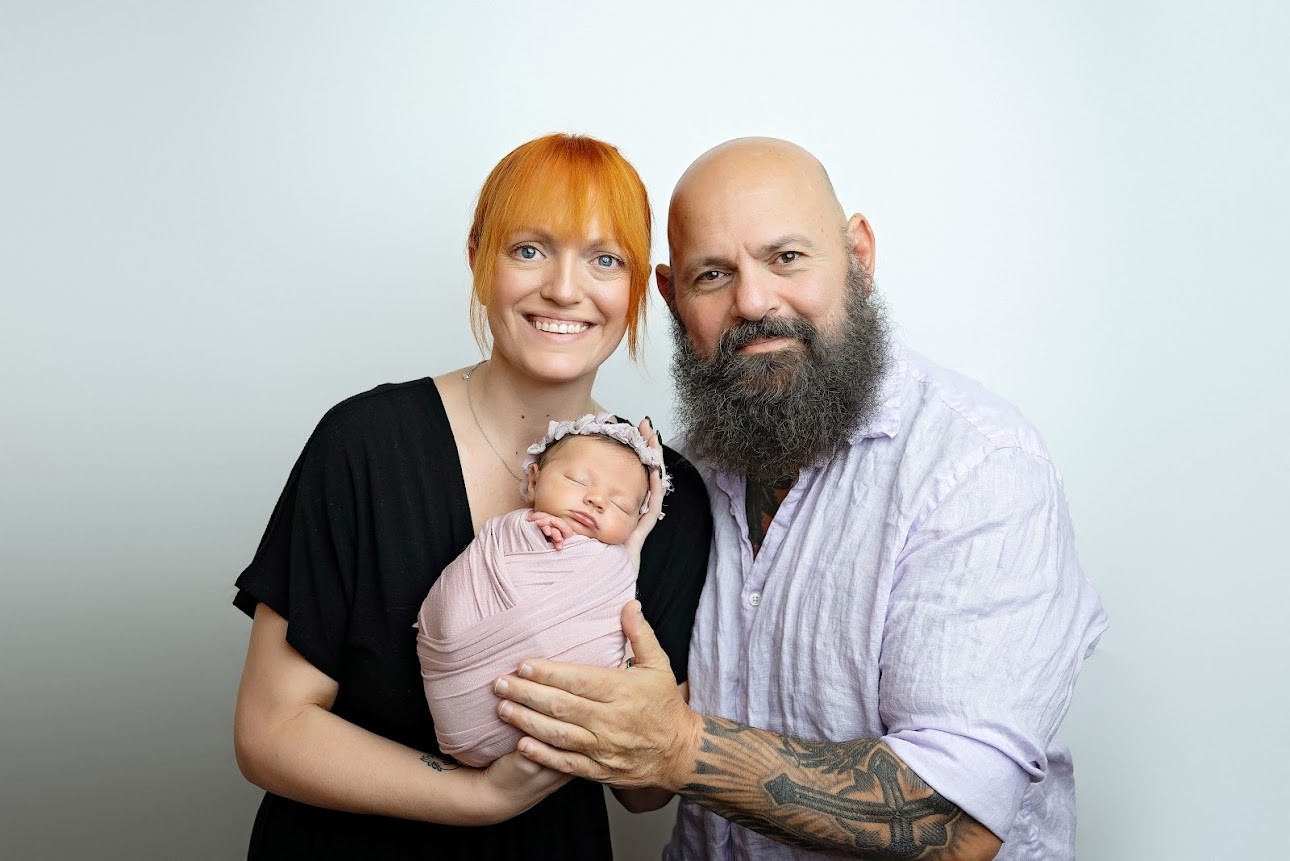Having a baby after your MS diagnosis doesn't mean accepting endless failed treatments or risking your health. When multiple sclerosis makes pregnancy feel risky or causes repeated IVF disappointments, surrogacy creates a safe, proven path to the biological child you've dreamed of. With expert guidance tailored to your unique situation, you can become a parent faster and safeguard your long-term health.
Ready to explore a different path forward? Learn more about surrogacy options for MS patients
You've already shown incredible strength managing MS and pursuing parenthood. Now it's time to work with your diagnosis, not against it, to build the family you deserve. We understand both the medical complexities you face and the emotional weight of fertility struggles—and we're here to guide you toward a solution that honors both your health and your dreams.
When MS Makes Traditional Family Building Feel Impossible
Multiple sclerosis affects more than just your nervous system—it can completely reshape how you think about starting a family. If you've been cycling through failed fertility treatments or avoiding pregnancy due to condition-related concerns, you're navigating challenges that most people simply don't understand.
The reality can feel overwhelming: disease-modifying therapies might need to pause for pregnancy attempts, leaving you more vulnerable to symptom changes. Each failed IVF cycle means more time away from the medications that help you feel stable. The stress alone can affect how you feel day-to-day, sometimes for months. Meanwhile, well-meaning friends and family ask when you'll "just relax and let it happen naturally"—as if relaxation could somehow work around autoimmune disease and complex medication schedules.
Surrogacy removes you from this challenging situation entirely. Through gestational surrogacy, a genetic child grows in a healthy environment as you maintain the medical care that keeps your MS stable. Using your eggs and your partner's sperm, but without the physical risks that make pregnancy feel like choosing between your health and your dreams.
How MS Quietly Affects Your Fertility Experience
MS impacts fertility in ways that many reproductive specialists don't always discuss in detail. Women with MS often face lower conception rates, partly from the condition itself and partly from the medications that help manage it.
DMTs—interferon beta, glatiramer acetate, Ocrevus, Tysabri—often require what doctors call "washout periods" before you can attempt pregnancy. During this time, you're essentially without the protection these medications provide against disease progression.
If that IVF cycle doesn't work? You're back to square one: restart medications, wait for your system to stabilize, then stop again for the next attempt.
This creates a frustrating cycle. The same immune system issues that affect myelin can sometimes interfere with how well embryos implant. Success rates may be lower than average, but neurologist concerns about stopping medication stay with you every time you consider trying again.
Finding Your Way Out of the IVF-MS Cycle
When you've been through multiple IVF failures, the core issue often comes down to an impossible choice between fertility treatment and MS management. Consistent treatment keeps your condition stable, but you need to interrupt that treatment to attempt pregnancy. It's a medical puzzle that can leave you feeling stuck between two important goals.
Each time you stop medication, you risk experiencing new symptoms or changes. Each failed cycle adds to disappointment and potentially affects how you feel physically. The financial impact continues to grow, but the emotional cost might be even more significant—watching time pass and feeling like you're not making progress toward either goal.
Surrogacy changes this dynamic completely. A surrogate takes on the pregnancy-related health considerations as you maintain the treatment plan that works for you. No medication interruptions. No pregnancy-related MS concerns. No compromising your long-term wellness for the possibility of parenthood.
Genetic Connection Remains Completely Intact
One question we hear often: "Will this baby really be mine if I can't carry the pregnancy?" Absolutely yes. Gestational surrogacy preserves complete genetic connection and removes the health considerations that make pregnancy complicated with MS.
If you already have frozen embryos from previous IVF attempts, they transfer directly to a surrogate—carrying your DNA and your partner's. For those just starting the process, the IVF portion works similarly to what you might have experienced, but with one important difference: the pressure lifts. MS medications can continue throughout egg retrieval and you focus solely on creating healthy embryos without worrying about preparing for pregnancy.
Even if MS has affected egg quality, donor eggs still allow your partner's genetic contribution and ensure the healthiest possible pregnancy environment—something your body might struggle to provide right now.
Complete Surrogacy Roadmap: From Consultation to Baby
Every step in our process removes condition-related complications and keeps you at the center of this experience. From initial questions to holding your newborn, we guide you through each phase:
Step 1: Medical Assessment and Program Design (Weeks 1-4)
The experience starts with understanding how MS affects your path to parenthood. We review your diagnosis, treatments, and concerns, working with your medical team to confirm surrogacy is the best option and assess how medications affect fertility planning.
Once confirmed, we design your program and explore financial options, including full-service or customized plans with clear costs and Sunfish financing.
- Integrated medical planning: Neurologists, fertility specialists, and our team work together to protect both MS management and family-building goals
- Tailored financial solutions: Clear cost information with financing options designed for families already managing ongoing medical expenses
Step 2: Finding Your Perfect Surrogate Match (Weeks 5-12)
We connect you with carefully screened surrogates who understand MS. You'll review profiles and meet virtually to discuss management and build connections. Our compatibility process evaluates personality fit, communication style, and location beyond medical requirements. Chosen surrogates undergo additional screening for MS preparation.
- MS-experienced matching: Access to surrogates who've worked with ongoing health needs, with matches typically completed in 1 - 4 months versus industry averages of three to six months
- Enhanced compatibility screening: Thorough evaluation to ensure the surrogate truly understands and advocates for this unique situation
Step 3: Legal Protection and Medical Coordination (Weeks 13-24)
Legal and medical frameworks protect everyone and address MS considerations. Our attorneys coordinate between your medical team and surrogate's doctors. Medical preparation coordinates IVF with current medications or evaluates existing embryos while preparing the surrogate.
- Condition-specific legal frameworks: Detailed contracts that address health considerations, medical decision-making, and emergency procedures
- Protected treatment continuity: IVF approaches designed around current MS treatment plans, whether creating embryos or preparing existing ones for transfer
Step 4: Transfer Success and Pregnancy Partnership (Weeks 25 - Month 16)
Embryo transfer begins an exciting partnership where you stay central to baby's development. You're present for transfer, supported through the two-week wait, and celebrated at confirmation. Throughout pregnancy, MS treatment continues uninterrupted while you stay involved in decisions and connected to milestones.
- Protected involvement: Present for all major moments and maintaining uninterrupted MS treatment for ideal long-term health
- Flexible participation: Stay connected to every milestone through communication methods that work with energy levels and mobility needs
Step 5: Birth and New Parent Transition (Months 16-18)
The baby's arrival brings you present for labor and delivery while our team handles logistics. Legal frameworks ensure immediate parental rights with MS accommodations. Care continues with guidance for new parents managing conditions, MS treatment coordination, and emotional support through counseling and groups.
- Seamless transition: Complete delivery care with MS accommodations and immediate legal procedures ensuring smooth parental rights transfer
- Ongoing assistance network: Specialized resources for new parents with long-term conditions plus continued emotional help and community connections
The complete process: 12-18 months from consultation to bringing baby home, compared to potentially years of fertility treatments that might compromise MS management.
Why Our Surrogate Matching Works Differently for MS Families
Finding the right surrogate when you have MS goes beyond medical compatibility—you need someone who truly understands chronic illness and the unique emotional landscape you navigate daily. Our matching process considers not just physical health requirements, but the emotional understanding and experience needed to advocate for intended parents managing ongoing health needs.
Our thorough screening process creates shorter wait times for quality matches. Other agencies might present any available surrogate, but we focus on women who've expressed genuine comfort working with intended parents facing medical factors. By the time we introduce potential surrogates, they've already shown they understand long-term conditions and are flexible about additional medical coordination this process might require.
Most MS intended parents find their match within 1 - 4 months of beginning their search. This efficiency means less time in limbo and more time focusing on the excitement of a growing family.

2 Months

1 Month

3 Weeks
Investment Reality: Surrogacy vs. Years of MS-Complicated IVF
When you look at the real cost of repeated IVF cycles during MS management, surrogacy often represents both better value and significantly better outcomes. Our investment typically ranges from $100,000 - $200,000+, covering everything needed to bring baby home—unlike the unpredictable, open-ended expenses of multiple fertility attempts with uncertain results.
Consider what MS adds to traditional IVF costs:
- Multiple medication adjustments requiring additional neurologist visits and potential symptom management
- Time away from work during treatment-related symptom flares
- Possible MS progression from repeated medication interruptions
- Relationship and mental health impacts from repeated disappointments during chronic condition management
Surrogacy eliminates all of these variables with predictable timelines and higher success rates. The investment includes surrogate compensation, complete medical coverage, legal protection, agency assistance, and insurance coordination—everything needed for the process with clear expectations.
Financing Surrogacy When MS Has Already Impacted Resources
We understand that MS treatment costs may have already affected financial situations. That's why we've partnered with Sunfish Financing to offer loans specifically designed for fertility treatments and surrogacy, often providing better terms than personal loans or credit options.
Additional resources worth exploring:
- Fertility grants: Organizations providing grants specifically for families facing medical barriers to pregnancy
- 401(k) options: Many employer plans allow withdrawals for medical expenses
- HSA/FSA utilization: These accounts often cover qualified fertility and surrogacy expenses
- Employer fertility benefits: Growing number of employers offering fertility assistance including surrogacy coverage
Our financial coordinators work with you to explore every available option, making sure MS doesn't prevent access to the family-building care needed.
Moving Beyond MS Guilt: You Deserve Parenthood
The hardest part of choosing surrogacy often isn't the logistics—it's letting go of the guilt. Guilt about needing help. About the financial investment. About how MS changed the family timeline. About not being able to carry pregnancy like it sometimes seems everyone else does effortlessly.
These feelings make complete sense, but they don't define worth as a future parent or diminish the love already felt for this child. Choosing surrogacy isn't giving up—it's finding a smarter path forward. You're selecting the safest, most effective route to family and protecting the health that lets you be the parent this child needs for decades to come.
The care you deserve goes well beyond medical treatment. We connect you with resources specifically designed for this experience:
- MS-focused groups for parents and intended parents
- Counselors experienced in both fertility obstacles and chronic illness navigation
- Online communities including r/MultipleSclerosis and r/surrogacy where you connect with others making similar decisions
- Fertility-focused therapists who understand the unique intersection of family-building dreams and ongoing health management
The future child will never question how they came into the world. They'll only know they have parents who made thoughtful, loving decisions to bring them into a stable, prepared family—parents whose health remained protected so they could provide decades of love, stability, and guidance.
Path Forward Starts with One Conversation
You've spent enough time working against the diagnosis instead of with it. The path to family doesn't have to include choosing between health and dreams. Surrogacy offers the genetic connection you want, the safety the condition requires, and thorough guidance throughout the process.
Thousands of intended parents with long-term conditions have used surrogacy to become parents faster and protect their long-term health. An MS diagnosis doesn't disqualify you from parenthood—it just means you need a different, safer approach.
Our team understands both the medical complexities of MS and the emotional obstacles of fertility struggles. We're here to answer questions honestly and help you take the first step toward the family you've worked so hard to create.
Ready to become a parent faster and protect your health? Contact our MS-experienced surrogacy specialists today. The baby is waiting for you to find the safest path forward.
Disclaimer: The information provided in this article is for educational and informational purposes only and is not intended as medical advice. American Surrogacy does not provide medical services and does not make clinical determinations regarding eligibility for fertility treatments or surrogacy. All medical evaluations and decisions should be made in partnership with licensed medical professionals.